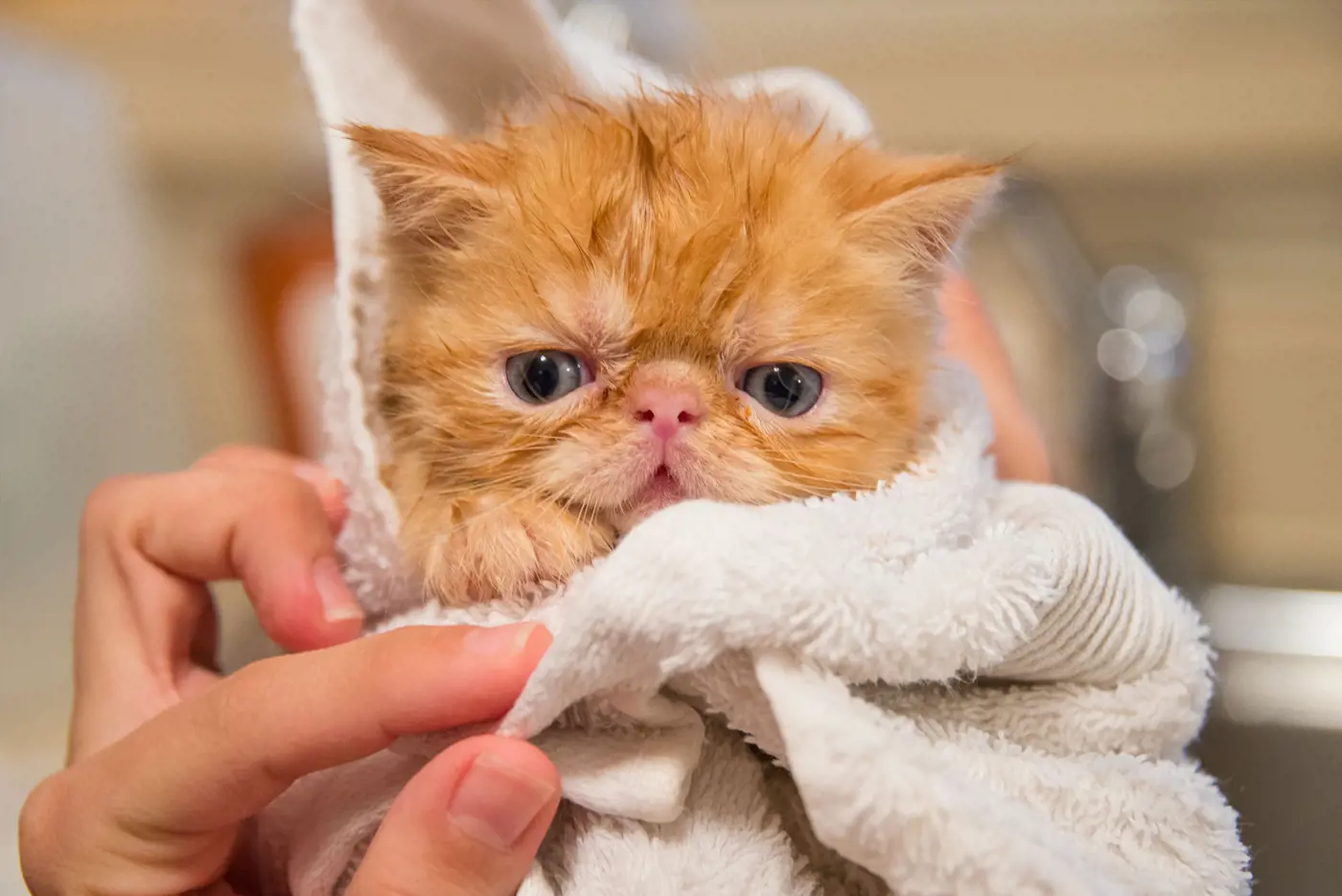Should you spay or neuter a kitten?
9th July, 2025

Should I spay or neuter my kitten? Did you know that a female cat can have up to 18 kittens in a single year? This staggering reproductive capacity is why most veterinarians strongly recommend spaying or neutering your kitten.
The veterinary team plays an important role in providing guidance and support for spaying or neutering your kitten, helping you make informed decisions about your pet's health.
When to spay a kitten is a common question among new pet parents. Veterinarians typically recommend the procedure at around four months of age, as female cats can start having kittens from this young age.
For male cats, neutering at the same age can prevent unwanted behaviours like territorial marking and aggression. What age to spay a cat matters significantly—doing so before six months can reduce the risk of mammary cancer by over 90%.
The decision to spay or neuter isn’t just about preventing unwanted litters. A study shows that 60% of cat owners who allowed their cat to have kittens wouldn’t do so again due to the challenges of finding homes. 52% reported difficulty finding good homes for the kittens. The procedure is remarkably safe, with most cats recovering fully within a few days.
Yes, you may want to spay or neuter your kitten for their health, behaviour, and well-being. Although a kitten insurance policy will not cover the costs of spaying, neutering or anything pregnancy-related, it may be helpful in providing peace of mind in the event that your kitten gets sick.
Throughout this article, we’ll explain everything you need to know about this common procedure and its lifelong benefits.
What does it mean to spay or neuter a kitten?
Neutering your kitten is one of the most important healthcare decisions you'll make as a pet parent. You may be wondering if you should spay or neuter your kitten - the answer is almost always yes.
Neutering is the general term used for the surgical procedure that prevents cats from reproducing. These operations are commonly referred to as 'spaying' for female cats and 'castration' for male cats.
Understanding cat spay and male cat neuter procedures
For female cats, spaying (also called an ovariohysterectomy) involves removing both the ovaries and uterus through a small incision in the abdomen. The removal of the cat's ovaries is a key component of the spaying process. This is performed under general anaesthesia, usually taking less than 90 minutes. Both male and female cats undergo general anaesthetic during the procedure.
Male cat neutering or castration is a simpler procedure where the testicles are removed through small incisions in the scrotum. This eliminates the production of testosterone, which drives reproductive behaviours. Both procedures require your cat to stay at the veterinary practise for the day, although they typically go home the same evening.
Differences between spaying and castration
While both procedures prevent reproduction, they differ significantly in complexity and recovery. The procedure for female cats is called spaying. Female cat spaying involves abdominal surgery with several layers of stitches that typically need to remain for 7-10 days.
The procedure for male cats is called castration. Male cat castration is less invasive, with smaller incisions that often heal quickly without requiring stitches. Furthermore, spayed females will no longer experience heat cycles or attract male cats, whereas neutered males generally display reduced roaming, fighting, and spraying behaviours.
Is it safe for kittens?
Although neutering is a major surgical procedure requiring general anaesthesia, it’s considered very safe when performed by qualified veterinarians. Modern anaesthetics and monitoring equipment have made the risk of complications extremely low. Also, modern techniques have advanced significantly, making these surgeries safer for the animals.
During the procedure, the vet will closely monitor your kitten's vital signs to ensure their safety. Your kitten will receive pain relief before, during, and after the procedure. Most cats recover rapidly, typically being back on their feet within hours and returning to normal within a few days.
When should you spay or neuter your kitten?
Timing matters greatly when considering whether you should spay or neuter your kitten. Getting this procedure done at the right age offers significant health and behavioural benefits, whilst preventing unwanted litters.
What age to spay a cat or kitten
According to veterinary experts, cats should be spayed at four months of age or younger. This recommendation has evolved over time.
Traditionally, cats were neutered from six months of age, but current scientific evidence shows no disadvantages to neutering at a younger age. Since kittens can reach sexual maturity and breed from four months, this earlier timeline is now widely accepted.
When can a kitten be neutered safely?
Most cats can be safely neutered at four months old. Neutering cats at a very young age is important in preventing unwanted litters. However, your vet might recommend waiting if your kitten is particularly small for their age or has been unwell.
For shelter kittens, neutering can safely occur as early as 8-12 weeks of age. Several studies confirm that early neutering poses no increased health risks.
Why early neutering is recommended
Early neutering offers multiple benefits. For female cats, spaying before their first heat cycle significantly decreases the risk of mammary carcinoma. In fact, cats spayed before five months show reduced likelihood of developing behavioural problems that often lead to relinquishment.
Early neutering in male cats substantially reduces territorial marking, fighting, and roaming—all common reasons cats end up in shelters.
Myths about waiting for a first litter
Despite persistent myths, there is absolutely no benefit for a cat to have "just one litter" before being spayed. Cats don't grieve missing their chance at parenthood, as they live in the moment. Instead, breeding can be physically draining for females and even risky.
A survey revealed that 60% of cat owners who allowed their cat to have kittens wouldn't do so again, primarily because 52% struggled to find good homes for the litters.
Why spaying or neutering is good for your cat
Deciding to spay or neuter your kitten offers substantial benefits that extend far beyond preventing unwanted litters.
Health benefits for female cats
Spaying your female cat delivers remarkable health advantages. When performed before six months of age, spaying reduces mammary cancer risk by an impressive 91%. This percentage drops to 86% when done between 7-12 months.
Moreover, spayed females live approximately 39% longer than unspayed cats. The procedure completely eliminates the risk of ovarian cancer and prevents potentially fatal uterine infections like pyometra.
Behavioural improvements in male cats
Male cats undergo significant positive behavioural changes after neutering. The procedure reduces roaming behaviour by up to 90%, decreasing the likelihood of your cat being injured in accidents or fights.
Neutered males also display less territorial aggression, are less likely to spray strong-smelling urine, and typically become more affectionate companions. Neutered cats may require adjustments in their diet due to hormonal changes, with foods formulated specifically for them to manage their calorie intake.
Reducing risk of diseases like FIV and FeLV
Neutering substantially reduces the risk of contracting serious infectious diseases. Feline Immunodeficiency Virus (FIV) and Feline Leukaemia Virus (FeLV) spread primarily through fighting and biting.
Research shows that entire male cats are substantially more predisposed to FIV infection than neutered males. Indeed, spaying or neutering inhibits transmission by reducing the primary modes of spread—fighting and breeding.
Preventing unwanted litters and overpopulation
Undoubtedly one of the most compelling reasons for neutering your kitten is population control. Unfortunately, millions of unwanted cats are euthanised yearly.
By choosing to spay or neuter your kitten, you help reduce shelter overcrowding and contribute to solving this crisis. Neutering also prevents unwanted kittens, ensuring that all cats have a better chance of finding safe homes and managing the cat population effectively.
Cost, recovery and support after the procedure
Once you've made the decision that you should spay or neuter your kitten, understanding the practical aspects of cost and aftercare becomes your next priority.
How much does neutering a cat cost?
The cost of neutering varies significantly based on your location and veterinary practise. Many kitten insurance policies don't cover routine neutering, as it's considered a planned procedure rather than unexpected treatment.
Kitten insurance and financial help options
Whilst cat insurance doesn't cover neutering costs, several financial assistance options exist. Cats Protection offers a means-tested neutering scheme for eligible owners. In London, the C4 Scheme enables qualifying cat owners to have their pets neutered for just £10. Always check with local animal welfare organisations for available support.
What to expect during recovery
Initially, your cat may seem sleepy or disoriented for 12-48 hours as the anaesthetic wears off. Male cats typically recover faster than females, with many back to normal within a day. Female cats generally need 10-14 days of restricted activity whilst their internal stitches heal.
It is important to monitor the surgery site for any signs of complications such as swelling, bleeding, or infection. Using a buster collar can prevent your cat from licking the surgical wound, which helps avoid irritation and potential complications.
Tips for post-op care at home
Create a warm, quiet space away from other pets and children. Provide easy access to food, water, and litter—preferably using paper-based litter that won’t stick to wounds.
Most importantly, ensure your cat wears their protective cone or suit until the wound heals completely. Using an E-collar is important to prevent your cat from licking or irritating the surgical site. Keep your cat indoors during the recovery period to avoid complications like infection or reopening of the incision. Limit jumping and excessive movement during recovery.
When to call your vet
Contact your vet immediately if you notice:
-
Excessive redness, swelling, discharge or odour from the wound
-
Not eating for more than 24 hours
-
Not urinating within 24 hours after surgery (a medical emergency)
-
Vomiting or diarrhoea
-
Extreme lethargy or inability to stand
Making the right choice for your kitten's future
Spaying or neutering your kitten stands as one of the most responsible decisions you can make as a pet parent. Throughout this article, we've seen how this routine procedure offers numerous benefits beyond simply preventing unwanted litters.
The optimal time for this procedure occurs around four months of age, though your veterinarian might recommend adjustments based on your specific kitten's health and development. After all, each cat has unique needs. The procedure itself is remarkably safe, with most cats recovering fully within days.
During recovery, your kitten will need a quiet, comfortable space and limited activity—particularly females who require 10-14 days of restricted movement. Male cats generally bounce back faster, often returning to normal within 24 hours.
The question "Should I spay or neuter my kitten?" may be a clear answer for a lot of pet parents—yes. This simple procedure prevents health problems, reduces unwanted behaviours, helps control the feline population crisis, and allows your cat to live a longer, happier life. Your decision today shapes not only your kitten's future but also contributes positively to the broader feline community.
Get a kitten insurance quote
Pet insurance does not normally cover the cost of spaying or neutering you kitten, but insurance can be a help with many of the unexpected costs of looking after your cat.
To get a kitten insurance quote for your furry friend you can get a quote through our website. If you would like to talk to one of our cat insurance team, you can get in touch with us on 0330 102 5748.
Frequently asked questions
The recommended age for spaying or neutering kittens is around four months. The best age to spay or neuter a kitten is around four to five months, following their initial vaccinations. This timing helps prevent unwanted litters and offers significant health benefits, including reduced cancer risks in females and improved behaviour in males.
Spaying or neutering offers numerous health benefits. For female cats, it significantly reduces the risk of mammary cancer and eliminates the risk of ovarian cancer and uterine infections. It may also prevent uterine infection (pyometra), a serious reproductive disorder. For male cats, it reduces the likelihood of certain cancers and decreases the risk of contracting diseases like FIV and FeLV.
While spaying or neutering can reduce certain hormone-driven behaviours, it doesn't fundamentally change your kitten's personality. Neutered males often become less aggressive and territorial, while spayed females no longer experience heat cycles. Overall, most cats become calmer and more affectionate after the procedure.
Recovery time varies between male and female cats. Male cats typically recover quickly, often returning to normal within a day. Female cats generally need 10-14 days of restricted activity for their internal stitches to heal. Most cats make a full recovery within a few days, although skin healing may take up to ten days. It’s important to follow your vet’s post-operative care instructions.
Helpful Pages
Recent Posts
Pet Insurance Quote
- 98% claims paid *
- Claims paid directly to vets
- 24/7 vet video consultations
- Interest free monthly payments




